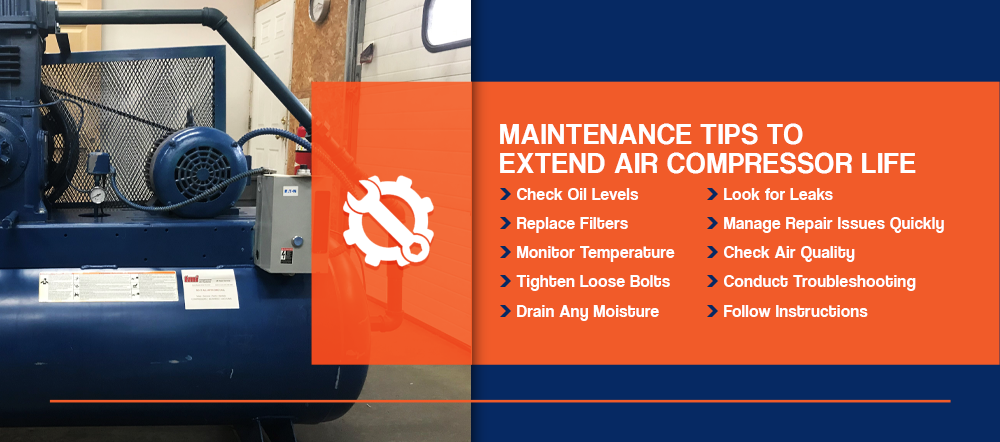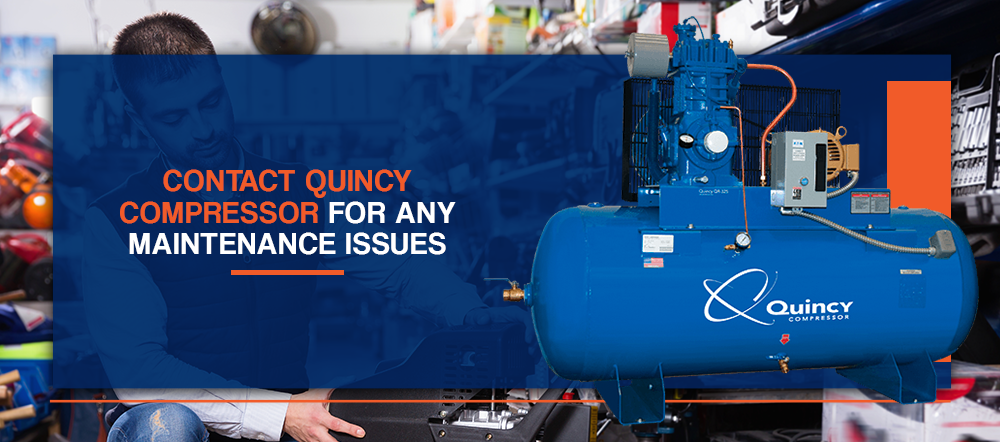
Purchasing a high-quality air compressor and providing it with proper maintenance is the best way to ensure your equipment will work when you need it to. Rather than waiting until a problem arises, employing preventative maintenance can ensure your air compressor runs reliably whenever necessary. It can extend an air compressor’s life and save you money on expensive repairs down the road.
Maintenance Tips to Extend Air Compressor Life
There’s no specific number regarding the life expectancy of an air compressor. The better you are at maintaining your compressor, the longer you can use it in your operations. Following these 10 maintenance tips will extend the life of an air compressor and keep you on track to finish projects on-time and on-budget:
1. Check Oil Levels
Think of an air compressor like a car engine. For it to run properly, it must be adequately lubricated. A good rule of thumb is to check an air compressor’s oil levels once a day — or if it’s not a daily use item, each time it’s used. To check the oil level, locate the air compressor’s oil level sight glass. The oil level should be at least halfway up or around the gauge’s center mark.
2. Replace Filters
When the compressor pulls in moisture and air, it can also grab debris and dust floating in the air of the surrounding environment. The air filter catches these debris particles so they don’t get stuck inside the air compressor, meaning it’s important to change the filter regularly. It’s a good idea to change the filter once a week to keep it working efficiently.
If you manage an oil-injected air compressor, it’s essential to change the oil filter regularly as well. This should be done weekly to prevent debris from damaging the air compressor. Regarding oil filter replacement, each model has its own process for changing the filter. Consult the operating manual before you begin to ensure you’re doing it correctly.
3. Monitor Temperature
Air compressors operate within a certain temperature range, which is outlined in the operating manual. If an air compressor becomes too hot, it can experience unnecessary wear and tear, ultimately resulting in a shorter lifespan. Many air compressors come with a built-in shutdown system designed to shut down the compressor if it becomes overheated.
Ideally, you don’t want to get to the point where the air compressor overheats. However, being familiar with its temperature limitations and testing the shutdown feature to ensure it engages properly are important steps toward maintaining a working air compressor.
4. Tighten Loose Bolts
An air compressor’s vibrations can cause screws and bolts to work their way loose over time. Each month, inspect and tighten any fasteners that may have come loose during use. Doing this will keep your machine in good shape and avoid any equipment breakdowns.
5. Drain Any Moisture
When an air compressor pulls in outside air, it removes moisture from the air and stores it in a receiver tank. If this moisture is left in the receiver tank, it will cause rust and damage to the air compressor. Get into the habit of draining the tank and wiping down any moisture in the air compressor prior to each use so the liquid doesn’t have time to build up inside.
6. Look for Leaks
Over time, the hoses inside of your air compressor can become corroded or cracked. If this happens, it can result in reduced air pressure or leaks. To prevent this, regularly inspect the hoses by looking for holes or potential weak spots. If you notice anything amiss, it’s a good idea to replace the hose to keep the air compressor working efficiently.
7. Manage Repair Issues Quickly
Minor maintenance issues, such as a dirty air filter or moisture in the reserve tank, might seem like things you can put off. However, delaying maintenance or minor repairs will likely result in bigger problems down the road. If left unchecked, a small leak or a few moisture drops could end up costing a lot of money to repair.
If the damage is bad enough, you might have to purchase a new air compressor. Being proactive about repair issues as soon as you notice them will extend the lifespan of your air compressor and save you a lot of money down the road.
8. Check Air Quality
Fluid or corrosion in the system can cause airstream contamination that will negatively impact the work you do with the air compressor. Regularly inspecting the air lines, filters and other parts of your air compressor will prevent airstream contamination and ensure that quality air is flowing through the system at all times.
9. Conduct Troubleshooting
The operating manual that came with your air compressor is the first place to turn when trouble arises. But don’t wait for trouble to happen to familiarize yourself with this manual. Take the time to read and understand how your specific air compressor works, including the best ways to maintain its parts to keep it running smoothly at all times. You can also visit the Compressed Air Systems webpage from the U.S. Department of Energy for tips and information on best practices and maintenance.
10. Follow Instructions
When a problem does arise, don’t try to fix it the way you did at another job or with another machine. Carefully reference the operating manual and closely follow its instructions for operation and repair. If you aren’t sure how to correct a problem or replace a part, contact a reputable service provider for help.
When to Call a Professional
Your company’s employees can perform daily and weekly maintenance. But when larger repair issues arise, it’s a good idea to call an experienced professional to diagnose and fix these problems. There are numerous reasons why calling a professional is beneficial, including:
1. Complex Repairs
Your workers can replace a hose or drain a tank with very little trouble, but a compressed air system professional can provide more extensive repair assistance, including corrosion in the air lines or bearing vibration.
2. Safety Inspections
You should periodically call on a compressed air system professional to shut down the air compressor and inspect all of its components for signs of rust, corrosion, leaks or tears. They can also look for electrical issues or faulty gauges that might be overlooked by someone else.
3. Drops in Pressure
A significant pressure drop can be a sign that there is a blockage or leak somewhere in the air compressor. Because air compressors can still operate with a drop in pressure, it may be tempting to put off maintenance. However, it’s best to have an experienced technician diagnose and repair the problem immediately. Failure to do this in a timely manner may result in greater damage and more expensive repairs.
Contact Quincy Compressor for Any Maintenance Issues
Over the last century, Quincy Compressor has established itself as a leader in the compressed air industry. Our made-in-the-USA rotary screw and reciprocating air compressors are manufactured with the highest standards of quality in mind. We stand behind our products and do everything possible to support the businesses and industries that rely on our equipment for their success. To purchase our products or request maintenance assistance, visit our Sales and Service Locator.



